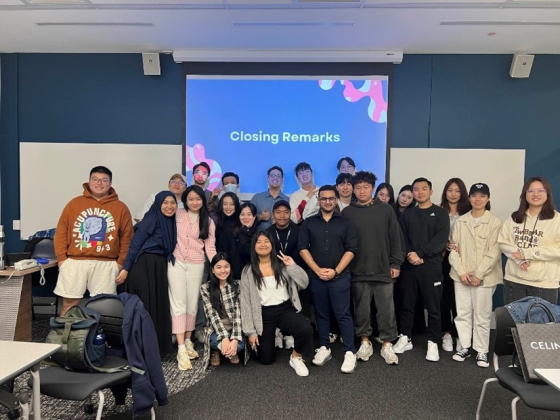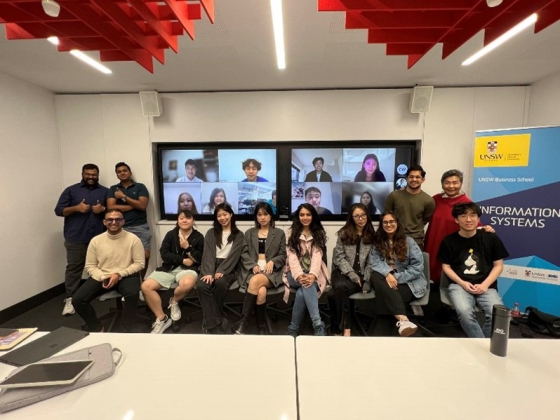Published 4 August 2023
AI case study: Collaborative project with personal learning reflection
The academics & their views on GenAI
A/Prof. Zixiu Guo and A/Prof. Carmen Leong from UNSW Business School share a common teaching philosophy, and a vision for continuously improving teaching practices and providing exceptional guidance and mentorship to students. They believe that education goes beyond the classroom and that the learning journey should be a transformative and enriching experience. Their teaching approach combines innovation, research, and a deep understanding of student needs.
Zixiu and Carmen see technology as an opportunity to improve and develop student learning. They are particularly interested in understanding the techno-stress that students and teachers may face so they can better think about the impact of recent technologies and adapt and reshape their educational practices to promote positive impact with these tools.
Assessment overview
| Course |
INFS5848: Fundamentals of Information Systems/Technology Project Management |
| Assessment type |
From a final report to a process-based group project with a personal learning reflection |
| Goal |
To develop skills needed for project management in an IS/IT context |
| Assessment focus |
Groups needed to develop a project management plan based on a chosen Information Systems/Technology project |
Driving change factor
Zixiu and Carmen quickly changed their T1 2023 INFS5848 group assignment from a final report to a process-based assessment approach, focusing on personalisation and interactions, promoting learning and reflections. Instead of avoiding or banning ChatGPT, they explained to students how they could embrace technology to assist them in producing better work. The individual reflection is the highlight of the assignment as it captured the iterative thinking processes that shaped learning. ChatGPT was the trigger to adopting this integrated approach to assessment.
Student use of GenAI
Students were allowed to use Generative AI tools to brainstorm IS/IT project ideas but needed to formalise, personalise and refine the ideas and explain or justify this in order to make it acceptable by the teachers. From the very beginning teachers were upfront and open about the use of generative AI to assist them, but also clearly articulated that they needed to build upon those ideas being generated.
Strategies that minimised Generative AI responses
Teachers' guidance
- Weekly student and teacher check-in points about student approaches and steps in developing their project management plan.
- Once off 10-minute optional consultations with the Lecturer In Charge (LIC) to provide contextual guidance and/or support.
- Tailored teacher feedforward comments provided to student groups based on check ins and submitted artifacts to further refine student work.
- Students provided opportunities/activities to act on teacher feedback with follow-up student-teacher interactions on progress.
Giving students responsibilities and ownership
- Providing ownership for students to select their own case and justify proposals aimed at developing critical thinking and evaluation skills.
- The project plan needed to be developed according to the contextual situation, issues, and circumstances of their unique case.
- A team charter is created at the beginning of the assignment to outline roles, expectations and agreements of each team member.
- Collaborative group work is required with unique input from each team member according to their roles.
- Different deliverables/artifacts that showcased the learning process by students each week.
- Recorded group meeting minutes detailing student input at every meeting.
What did they learn?
| |
Students |
Staff |
| Benefits |
Greater appreciation of the assessment
- They believed the iterative process shaped their thinking and learning about project management which they could apply in the real-world context: The use of Generative AI tools for brainstorming helped students improve their project quality.
|
Time saver!
- The assessment doesn't have to be re-written every term as students are choosing their own project and case.
- Ongoing communication and check-in points with students makes final marking more informed and efficient.
|
| Challenges |
- One deliverable is required every week so there is a tight turnaround time and hence the importance to communicate expectations.
- Unfamiliarity with using Generative AI technology to assist with their learning and work.
|
- Time commitments required, for example, meetings with student groups and guidance given to teaching staff each step of the way.
|
Some comments from students included:
“We were given the freedom to select a problem and come up with our own solution, this really helped me to analyse the situation rigorously and think of a possible recommendation critically.”
“The chance to work with a group of people from diverse fields of study allowed me to work collaboratively in a way that complemented each of our strengths and weaknesses.”
“We record the meeting minutes to monitor communication, and we can find in our working diary why we called and what we have solved. This essential learning is important to career advancement in the future.”
Next time
Zixiu and Carmen are considering giving guidance on the types of prompts that are most effective to help students further leverage generative AI tools. They are also considering replacing their final examination with other authentic assessment to assess students in a meaningful way.
Enjoyed this article? Share it with your network!


